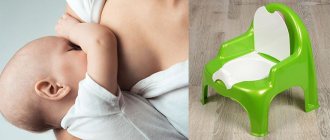Features of stool in infants
A breastfed baby's stool can be anything. Unlike a newborn who is on artificial formula, the quality and quantity of a baby's stool changes regularly. The determining role in this case is played by the age and behavior of the children.
In the first week, newborns have stool at least 3 times a day, sometimes the number reaches 12. If there is no stool for more than a day, this indicates that the baby is not receiving enough milk.
After 6 weeks, the baby usually begins to have fewer bowel movements. However, some continue to go to the toilet after each feeding. There is nothing unusual about this. Much depends on the diet of the nursing mother, the number of feedings and even the psychological state of the baby.
During this period, it is allowed to have no bowel movements for up to a week if the baby behaves calmly and gains weight normally. The consistency and color of the stool varies. At the same time, the smell is often sour milk or there is no smell at all. White lumps and a small amount of mucus are also possible.
With the introduction of complementary foods after six months, stool occurs less frequently and decreases to 1-2 times a day. Please note that color and consistency are greatly influenced by complementary foods.
How can you anticipate that your baby’s stool is not in order if the color and consistency are constantly changing? Pay attention to your baby's behavior and growth. If the baby's weight does not increase or even decreases. Read about the norms for weight gain here https://vskormi.ru/general-questions/norma-pribavki-vesa-u-novorozhdennyh-do-goda/.
If before or during bowel movements the baby cries and behaves restlessly. Changes in behavior and well-being, changes in the appearance of a newborn are a reason for increased attention to the baby’s digestion.

Color
Infant feces can be of different shades: bright and light yellow, orange, light and dark green, light brown. What affects color:
- Type of feeding. When breastfeeding, the stool will be green;
- Medicines that mother takes. Digestion reacts to antibiotics, activated carbon and drugs that contain iron or dyes. The stool becomes much darker than usual and may even turn black. Black stools don't mean anything bad!;
- Start of complementary feeding. The color is influenced by the foods that the mother begins to feed the baby. At the beginning of complementary feeding, the stool turns green. There may be yellow, white or green inclusions;
- The baby does not digest breast milk well, which causes green or orange stools;
- Bilirubin is a bile pigment that appears due to the destruction of blood proteins. It gives stool a yellow-brown or orange tint. This reaction occurs in 70% of babies. It goes away without treatment, since bilirubin is independently eliminated from the body through urine and feces;
- Dysbacteriosis. If an imbalance occurs in the intestinal microflora, the stool becomes lighter. However, feces acquire light shades even during teething.
Pay special attention if your baby has white stool (discolored stool)! This is a symptom of hepatitis! This disease is rare in children in the first two years of life, but has an unfavorable prognosis. Therefore, if your baby’s stool is discolored, consult a doctor immediately!
If only the color of a newborn changes, but the smell, consistency and presence of impurities remain the same, then the problem is in the type of food.

Consistency
The consistency of stool in infants also varies. It is mostly liquid, because for the first six months of life, the baby receives liquid milk food. With artificial or mixed feeding, the stool is thicker and darker.
But how can you tell if your baby has normal loose stools or diarrhea? A newborn has diarrhea if:
- The stool is both loose and watery;
- The frequency of bowel movements increases;
- The stool has an unpleasant odor and a distinctive green or yellow color;
- The baby's temperature rises;
- Vomiting begins;
- There is a lot of foam and mucus in the diaper, there are streaks of blood;
- The baby is lethargic and weak.
However, yellow or green stool mixed with foam or mucus does not always mean diarrhea. Always look at the baby's condition. If weakness, fever, or increased gas formation appear, then you should sound the alarm. If the baby sleeps well and feels cheerful, then there is no reason to worry.
Impurities
The presence of impurities in the stool is normal if the baby feels well. However, if you have a fever, loss of appetite or weight, be sure to visit a doctor.
Types of impurities:
- White lumps are particles of curdled milk that appear when the baby overeats. The digestive system simply cannot cope with the volume of food during feeding. In addition, indigestible food often appears after the start of complementary feeding. This leads to rapid weight gain in the baby.;
- Mucus is present in the stool of every newborn in small quantities. An increase in mucus indicates the beginning of the inflammatory process. This occurs due to improper breastfeeding, inappropriate formula, overfeeding, taking medications, early introduction of complementary foods and other reasons;
- Foam is a functional disorder that does not indicate any disease or pathology. Foam appears due to colic or increased gas production in the baby. However, excessive foam may be a symptom of dysbiosis or intestinal infection;
- Blood is a serious symptom that requires medical attention. This is often an indicator of dermatitis, rectal fissure, inflammation or pathology of the intestine, or protein allergy.

Frequency
In the first month of breastfeeding, stool occurs after every meal. Then the frequency is reduced by 2-4 times, the baby can generally start going to the “toilet” once a day or two. This is due to the renewal of breast milk.
During this period, the baby is capricious and sometimes refuses to breastfeed. This is a temporary phenomenon and there is nothing to worry about. If there is no bowel movement for 2-3 days, but there is no discomfort during bowel movements, and the baby does not lose weight, then the delay is not constipation.
Signs of constipation in a newborn:
- Difficult bowel movements;
- Retention of stool for more than 1.5 days;
- Significant discomfort during bowel movements.
By the way, constipation is rare during breastfeeding. They are typical for newborns on artificial formulas. However, if constipation occurs in a baby, then pay attention to the diet of the nursing mother. With this problem, plums, dried apricots and prunes will help perfectly if the newborn does not have allergies. And remember how much to use!
A massage will also help. But with the use of medications it is better to wait. Before taking medications, be sure to consult your doctor!

What kind of stool is in the first days of a baby’s life: is green color pathological?
Young parents should know that newborns have a bowel movement for the first time in their lives 2–3 days after birth. In this case, feces have a dark green or greenish tint, rarely black.
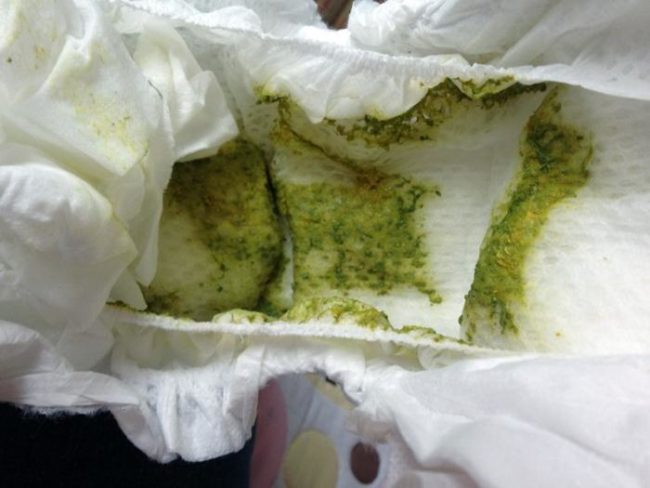
The stool has a green tint 2–3 days after birth.
The mass is called meconium . It is a liquid that comes out of a child’s body in the first days of his life and has absolutely no odor. There is absolutely no pathology in dark and green colors. Feces of this color indicate the normal development of the children's intestines.
Stool acquires an unusual color due to the amniotic fluid that the child swallowed in the womb. The appearance of meconium in the first days of a baby’s life is a good sign for young parents. If it is released for a week, then you should immediately show the child to the pediatrician.
Grayish or gray-green stool
Starting from 3–5 days or at the end of the first week of the baby’s life, the feces become grayish or gray-green.
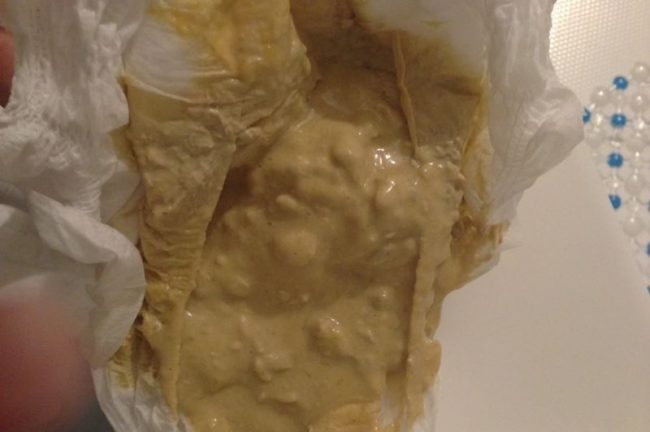
On days 3-5, the stool becomes gray-green.
The mass becomes gradually thicker. This sign indicates a sufficient supply of breast milk to the child’s body and normal development of the gastrointestinal tract.
2 weeks of life
Starting from the 2nd week of life, a newborn’s stool becomes mustard or yellowish in color.
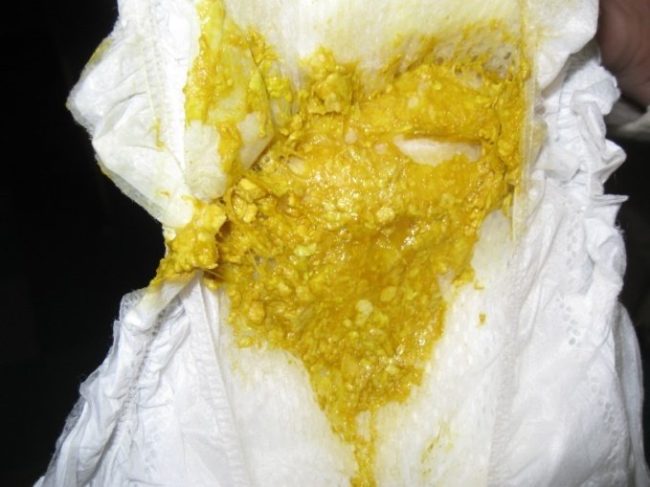
From the 2nd week of life, feces become yellowish.
The consistency is between liquid and porridge. There is a not very strong sour milk smell. The presence of mucus or white grains in the stool is acceptable. Parents should consult a doctor if the stool is too loose or hard.
It is worth noting that up to one and a half months, newborns fed on breast milk go to the toilet in very different ways . There are cases, without pathology, that children relieve themselves up to 12 times a day, while for others it is quite normal to relieve themselves up to 5-6 times a day.
2 and 3 months of life
Starting from the second and third months and life, feces are passed less frequently. For some it may be 3–5 times a day, for others 1–2 times a week, and this fact is not considered a pathology.

From the second and third months of life, feces are passed less frequently.
The main thing is to show the baby to the pediatrician in a timely manner and talk about the peculiarities of his stool, so that the doctor can voice its norm, taking into account the physiological characteristics of the baby.
Is this normal or is it time to see a doctor?
Normal stool
| Age and conditions | Characteristic |
| The first three days after birth | Black or black-green, tarry, odorless |
| 3-7 days | Grey-green or grey, semi-liquid or pasty |
| More than a week while breastfeeding | Color ranges from yellow to brown or mustard, mild sour-milk odor. The consistency resembles liquid semolina porridge. There may be inclusions of white grains, mucus or green matter |
| On artificial or mixed feeding, at the beginning of complementary feeding | Dark brown or light brown color, sometimes interspersed with greenery, mushy or thick consistency, strong unpleasant odor |
| When eating colored fruits and vegetables | Unusual shade with splashes of color |
Needs attention
| Characteristic | Causes | What to do |
| Yellow, brown or green stools of a watery or foamy appearance with a pungent sour-milk odor; There is often irritation around the anus | Excess milk from mother; The baby receives a lot of sweet foremilk. | Switch breasts less often when feeding |
| Brown, green or yellow with a lot of mucus | The baby has recently had an acute respiratory viral infection or is starting to teethe | The stool will return to normal after some time, but if this condition continues for several days, consult a doctor. |
| Thick and soft or mushy dark brown in color | Taking medications that contain iron | If your stool has changed due to taking medication, there is nothing to worry about. Otherwise, consult a doctor! |

To the doctor!
| Characteristic | Causes |
| Frequent stools that are yellow, green, or brown in color and have an unpleasant odor. Baby is losing or not gaining weight | Disorder due to allergy, infection or poisoning |
| Hard “hard” feces come out in portions with a tense abdomen. During the process, the baby screams. | Constipation due to introducing new foods into the diet |
| Green color with a lot of foam, sharply sour odor, appears with a “pop”. There is irritation around the anus. The baby is restless and slowly gaining weight. | Often means the development of primary or secondary lactose intolerance in the baby |
| With blood | Cow protein allergy, symptom of intestinal bleeding, hemorrhoids or bacterial infection |
| Discoloration of stool or white stool | Infectious disease, hepatitis |
Artificial feeding
What should the stool look like in a bottle-fed newborn:
- daily;
- thick;
- homogeneous;
- yellow-brown color.
Since stool in newborns during breastfeeding is unstable, it is useless to sound the alarm at the slightest deviation. You should seek help from a doctor if there is a complex deviation or if additional symptoms appear.
When to sound the alarm:
- frequent bowel movements in a newborn during breastfeeding - more than 10 times a day ;
- the color of the child's stool becomes black;
- blood is visible in the stool ;
- there is a lot of mucus in the feces;
- with a sharp change in the frequency of bowel movements.
Any deviations in the structure of feces in breastfeeding infants are caused by the mother’s diet.
How to normalize stool
If there are minor irregularities in the baby's stool, and they do not require a visit to the doctor, then you can adjust the stool yourself. First of all, a baby’s stool is affected by the nutrition of the nursing mother.
How to adjust a chair:
- Include fermented milk products, dried fruits, and vegetable dishes in your menu. If your baby is constipated, avoid eating nuts, fatty cheeses, flour products, white bread, strong tea and coffee;
- Drink more fluids. The minimum norm is 2.5 liters per day;
- Continue breastfeeding for as long as possible. As practice shows, children on artificial formula suffer more from digestive disorders, colic and constipation;
- Introduce new foods into your diet gradually and in small doses. Carefully monitor your baby's reaction, as such food can cause allergies, colic, and bowel problems;
- Give your baby a tummy massage regularly. Stroke your stomach in a clockwise circular motion;
- Encourage your baby to engage in active movements and games. This will improve intestinal contractions.
These recommendations will help not only improve your bowel habits, but also prevent many problems.
Therefore, even if the newborn’s stool is normal, the methods will be a good prevention. Subscribe to our VKontakte group
Deviations from the norm
It is necessary to closely monitor your child's bowel movements. The stool of a breastfed baby can tell about the baby’s illnesses.
Frequent and foamy stools in a newborn
Frequent defecation of liquid feces can occur due to infection of the body.
Dangerous signs that require calling a doctor:
- heat;
- thin and watery stool;
- presence of blood and foam;
- a large amount of foam;
- underweight and lack of gain compared to the last weigh-in;
- frequent regurgitation, vomiting.
The presence of foam indicates possible dysbacteriosis, food allergies, and gases. A large amount of foam indicates the presence of an intestinal infection.
Adjusting the chair
The use of medications will help in this situation: antibiotics, antiviral drugs, prebiotics. And the mother should exclude from her diet foods that cause gas formation and have a laxative effect.
Constipation in infants

Difficult bowel movements may be due to the following reasons:
- The baby has not had a bowel movement for more than 3 days.
- The child behaves capriciously and cries all the time.
- The baby's belly is hard and inflated.
- The stool is hard and dry.
- The child bends his legs, which may indicate pain in the tummy.
- Also, a newborn may have hard stools during mixed feeding when complementary feeding has begun.
- Impaired intestinal motility.
Never use thermometers or soap for self-medication. This can lead to inflammation, disruption of microflora and even damage to the rectum.
Constipation in babies who drink mother's milk is extremely rare. The following products will help to regulate bowel movements: porridge, fruits, boiled vegetables, kefir, prunes. Mommy should eat these foods more often, and if complementary foods are introduced, they should be given to the child as well.
Often, mothers after childbirth are prescribed medications containing iron to increase hemoglobin. Such medications can also cause hardening of the baby's stool.
What will help:
- Before each feeding, the baby must be placed on his stomach.
- It is necessary to give the baby the required amount of fluid.
- You should massage your tummy.
- You need to do gymnastics.
- If none of the above gives results, then use laxatives prescribed by your doctor.
- Glycerin suppositories and Microlax enema will also help.
- Exclude from the diet of the mother or child: peas, beans, cabbage, cucumbers, grapes.
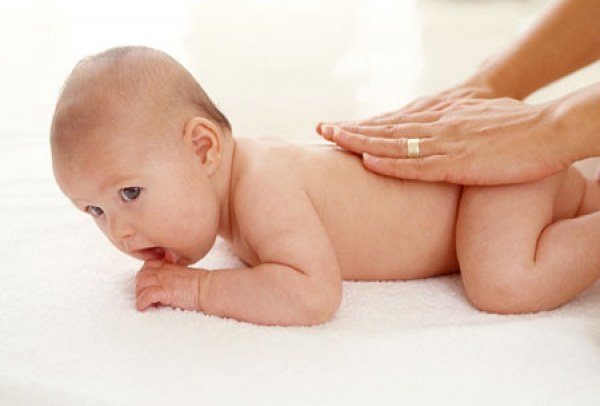
To avoid constipation, you should place your baby on his tummy more often.
Mucus in baby's stool
A small amount of mucus is always present in the feces of all people. If there is a lot of it, the inflammatory process has begun.
The reasons for the appearance of this symptom in breastfed infants:
- incorrect attachment to the breast;
- introducing complementary foods ahead of schedule at 6 months;
- runny nose;
- reaction to drugs;
- gluten or lactase deficiency;
- dermatitis;
- dysbacteriosis;
- intestinal infection;
- infection in the body.
Will help:
If the first causes are excluded, then you need to contact your pediatrician to determine the presence of the disease and get a prescription for treatment.
When you shouldn't hesitate to see a doctor
If the following symptoms appear, you should immediately make an appointment with your pediatrician:
- frequent bowel movements (more than 12 times a day);
- infrequent urination (dehydration);
- excessive regurgitation;
- abdominal pain;
- presence of bad breath.

